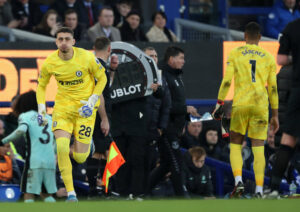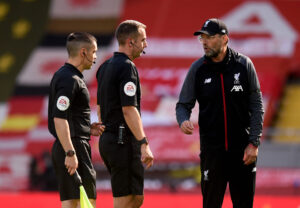At first, it all looked innocuous, as it initially always does. Crystal Palace had a chance to double their lead at Old Trafford, but Jordan Ayew’s shot was blocked by Victor Lindelof and Manchester United thought they had gotten away with it. Except they hadn’t, as VAR called back Martin Atkinson to check for handball, and Atkinson pointed to the spot after checking out the monitor, to help Palace to a win. But, looking at the replays, you could almost wonder Ayew deliberately struck it onto Lindelof’s arm.
Of course, it seems like a daft conspiracy theory, but we can’t rule anything out with this handball law. For many, it’s the primary source of ire at the moment. When Palace were on the other end of the rule this weekend against Everton, Roy Hodgson didn’t hide his disdain. “I just don’t understand how we’ve allowed it to happen”, said the Eagles manager.
New Handball Law is a Product of VAR
Outrage at the Handball Law
If Hodgson’s criticism reeked of hypocrisy, Steve Bruce’s definitely didn’t, as he still moaned about the rule despite the fact that his Newcastle United side benefitted from the rule against Tottenham Hotspur on Sunday. “If you’re going to tell me that is handball then we all may as well pack it in”, said the Newcastle manager. “It’s a nonsense, a nonsense of a rule. It’s gone for us today – however, it’s ludicrous.”
From Crystal Palace and Newcastle to the Spanish divisions and Serie A (peep Roma’s draw with Juventus at the weekend), the handball law is causing vitriol. Of course, there are many who point out that this rule is another thing snuffing the life out of football, alongside VAR, and there’ll be many who’d rebut that with how this handball law isn’t about the VAR, but the rules. However, let’s not muck about – this law is very much about VAR.
The Myths of VAR
VAR was sold to us on some myths. The first is that refereeing decisions were awful, and ruining the game. Refereeing in its orthodox mould was outdated and impossible to govern football in the modern era. This wasn’t helped by the fact that the media played their part. Soon, pundits and press alike spent time amplifying and dissecting refereeing decisions instead of talking about the game itself. Not to mention how the game became complicit in allowing referees to become targets of abuse, from both fans and players alike.
Another myth of VAR was that its introduction would fix football. Football needed (and still needs) fixing, in terms of the financial inequality that has made a few go bad and go bust, while the rich get richer. But VAR’s myth was ‘football needs fixing on the pitch’ – as we didn’t seem to clock that this was ultimately a sport that couldn’t be boxed; a sport that couldn’t be seen as black and white.
Football and Finance
Plus, there was the over-egged importance placed towards outcomes in football. It became life and death. A decision wasn’t something that might impact a game anymore, but rather affect the finances of clubs. Take Cardiff City’s loss at Chelsea in 2019, where many cited a questionable decision that could help relegate Cardiff from the Premier League. The influx of many made football more important than it was, simultaneously making it less appealing.
Football became a financial product more than a sport. As a result, the Championship play-off final became less about football and more about being ‘the richest game in football’. The game became plagued with gambling and gambling organisations. Players became commodified and de-humanised. Matches became viewed through a financial lens.
VAR and Handball Law
But another myth around VAR – if not of it – was the rule of ‘clear and obvious’. Football is not a sport of clear and obvious, it’s not yes/no game, but rather a subjective sport of perspectives. What’s a foul? What’s not? What’s a red card? What’s not?
This is where the handball law comes in. Before the introduction, handball was still questionable – let’s not pretend it wasn’t. But it was less scrutinised, and the fact that it was left to the referee to decide recognised that it was subjective. The introduction of VAR, a system supposedly said to be about clear and obvious, was never to go work with it. Hence, re-definition of the rules. Football’s rules were readdressed to accommodate VAR’s need for something to be clear and obvious, and as we’ve seen, there’s little much that’s clear and obvious about football.
VAR and Handball in the Future
As many have noted out, whether you love it or hate it, VAR is very much here to stay. So, what does this mean for the handball law? Keep it, and the outrage continues, as the rule seems an incredibly simplistic setting in an incredibly layered sport. Bin it, and you get back to a stage in which you have a system to detect clear and obvious with rules that aren’t clear and obvious.
There doesn’t seem to be a simple choice. And so, we ramble on, with endless outrage and continuous scrutiny, in a sport where everything seems increasingly policed.
Main Photo






